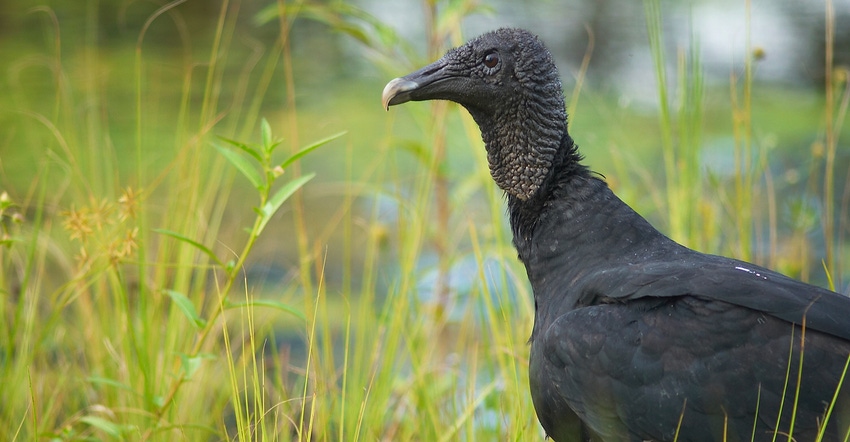
Populations of black vultures attacking young livestock have been on the rise in Missouri, but now livestock farmers have a recourse to stop these predators.
The Missouri Farm Bureau recently obtained a statewide depredation permit for black vultures from the U.S. Fish and Wildlife Service. MOFB has the authority to issue sub-permits to livestock producers who are experiencing problems with black vultures.
“In order to expedite the permitting process and reduce the costs for farmers and ranchers, Missouri Farm Bureau has agreed to serve in this role to reduce the problems with black vultures,” MOFB President Garrett Hawkins said in a news release. “Farm Bureaus in other states have served in this capacity, and we hope our efforts in Missouri are successful as well.”
Missouri will serve as a pilot state for the new black vulture depredation program through USFWS, said Sara Parker Pauley, director of the Missouri Department of Conservation.
“Black vulture numbers are on the rise, causing significant depredation issues to Missouri cattle ranchers,” she said, “so this partnership is critical to solving these issues together because they impact both our conservation and agriculture resources.”
Identifying the problem
Missouri is known for its turkey vultures with their red heads. They often are seen as harmless, feeding on dead carcasses. It is not the black vulture, which is aggressive, attacking live animals.
The black vulture, with its black or grey head, is smaller than turkey vultures. The black vulture has a large, black body with a naked black head. Its wingspan is about a foot shorter than the turkey vulture, with black features and white on the tips. The beak is also black with a white tip.
For years, the black vulture was a problem for Southeastern livestock farmers, but in recent years, it migrated to Ohio, Indiana, Illinois and Missouri. In recent years, Missouri cattle and sheep producers experienced black vulture attacks on young stock.
Since this type of vulture is protected under the federal Migratory Bird Treaty Act, legal methods of removing them are limited.
Rules for removal
Livestock producers may apply to MOFB for a livestock protection sub-permit for removing black vultures attacking animals.
According to MOFB, the following rules apply:
Sub-permits will be issued to livestock operations only.
Applications will be scored based on past livestock losses, number of livestock on the applicant’s farming operation, number of black vulture roosts and birds in the immediate vicinity, and the county ranking of livestock with Missouri.
A maximum of three “takes” may be issued to an approved applicant and will be determined by the application score.
Applicants must agree to follow all rules and regulations required by USFWS in the MOFB statewide permit.
Livestock producers interested in a sub-permit application can request one by contacting, Kelly Smith, MOFB senior director of marketing and commodities, at [email protected] or 573-893-1416.
Applications must be fully completed, signed and dated by the livestock producer, and returned for consideration by the Marketing and Commodities Department.
MOFB also encourages producers experiencing extensive depredation issues or having large black vulture roosts on their property to reach out to USDA Wildlife Services to review the conflict and to develop a comprehensive black vulture management plan.
About the Author(s)
You May Also Like






